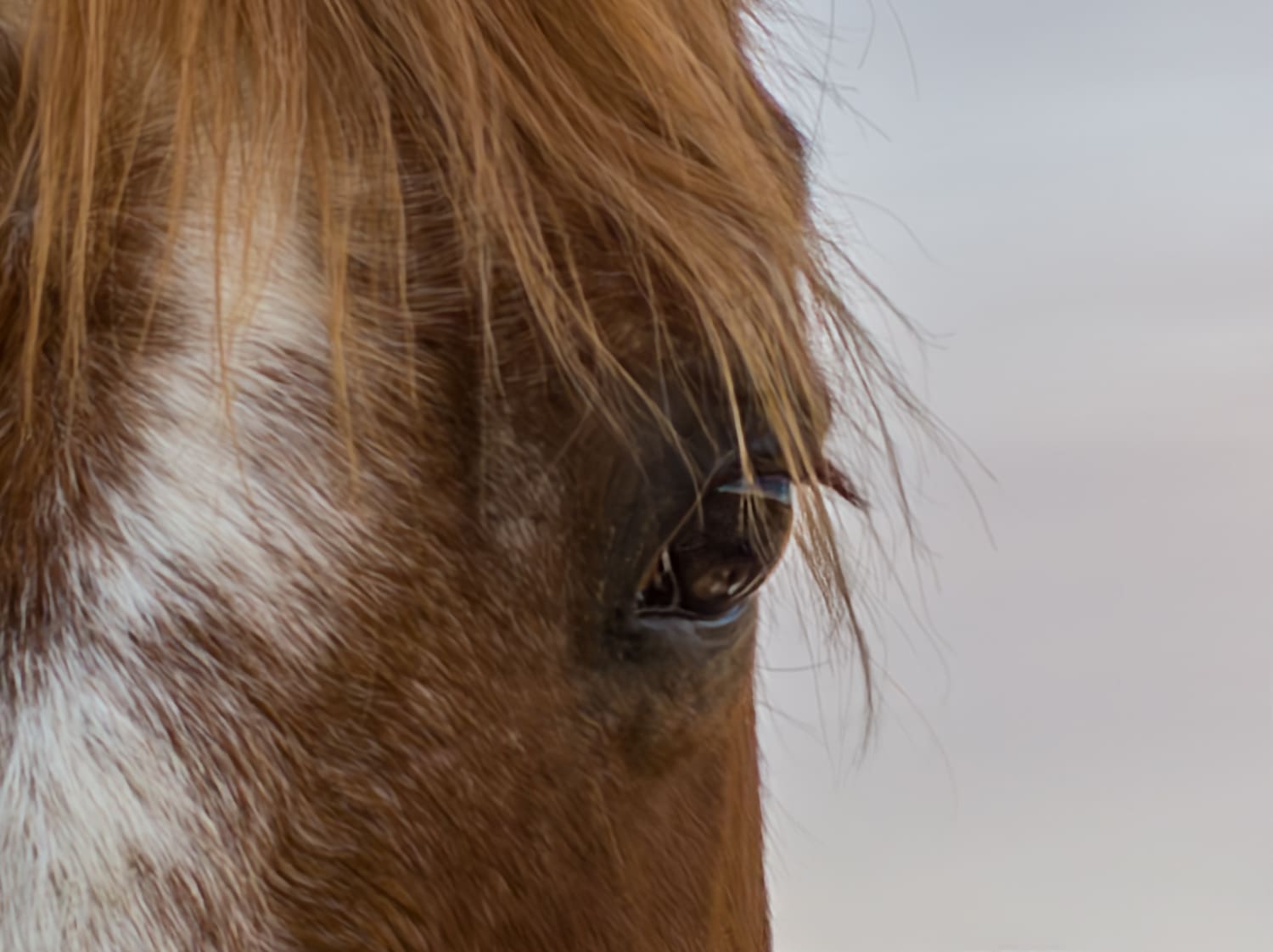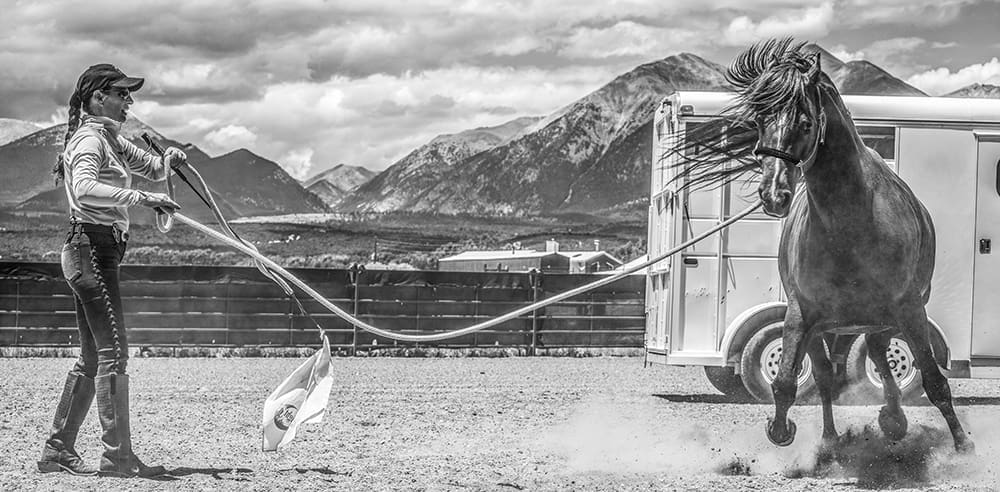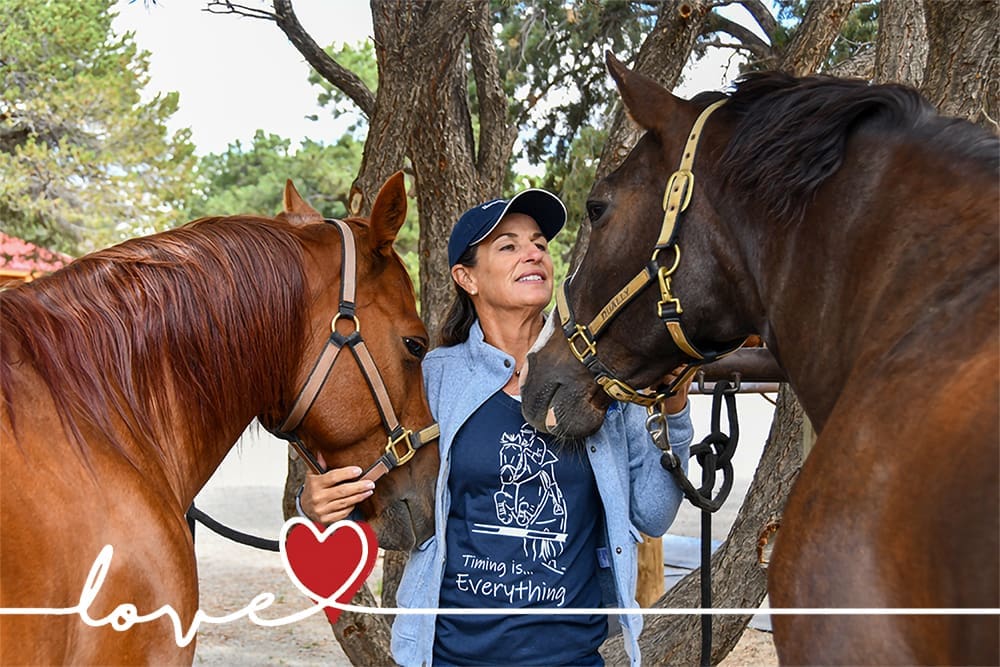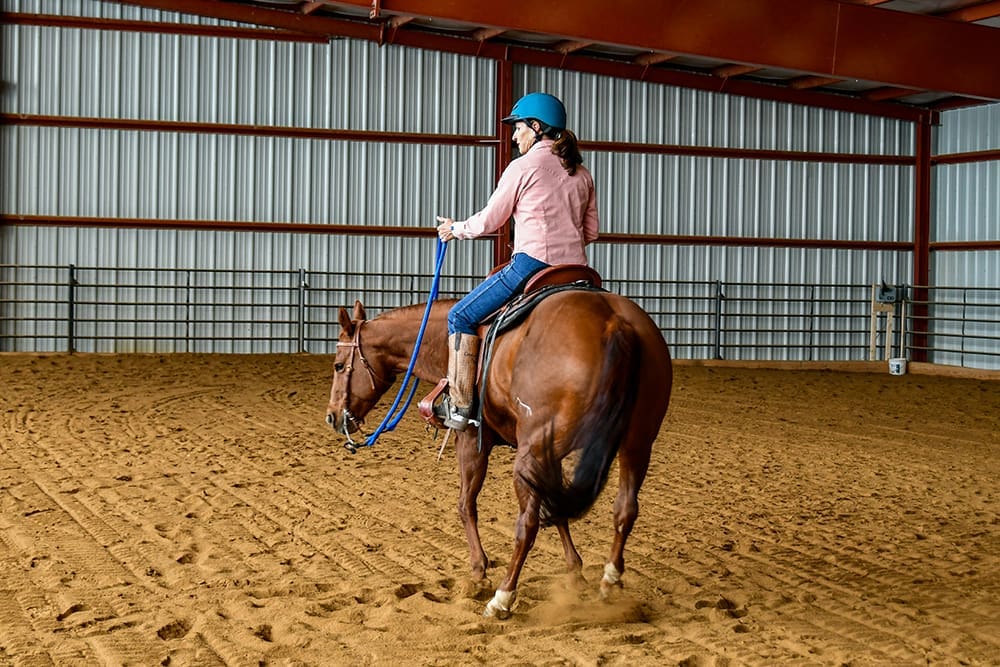A group of seven of my horse-loving friends decided to get together and ride each Wednesday evening this summer. Our group consisted of new riders as well as pros, green horses and finished show horses. Our goal was to have fun riding together and to practice skills so that we would keep advancing our horsemanship. Everyone one can keep learning and riding together with friends helps keep us all motivated. Our rules were simple: show up if you can, have fun, and take turns organizing the horsemanship practice topic for the meeting.
The riding club nights were a highlight of the summer and I learned something new during each ride. One night, the lesson learned was about awareness. Becoming aware was the goal for new riders and learning to teach with awareness was the goal for the more seasoned equestrians. Teaching a new rider to be aware (and learning when even the most seasoned horse is testing you) is a skill that will advance your horsemanship. Being aware of your horse is more important than simply learning new cues and directions.
The Scenario:
It was the inaugural meeting of our summer riding club. For most of us, the evening ride got off to a great beginning, but for some, it was a rocky start.
Our friends and neighbors, Jack and Cheryl, were part of the club and we were all excited to have the husbands join in our fun. Cheryl is a seasoned and dedicated rider and the owner of two well-trained and mature horses. But up until now, Jack’s horse experience was limited to feeding and doing chores when Cheryl was out of town. Nonetheless, Jack was enthusiastic to be part of the club and at least half interested in getting comfortable enough on a horse to accompany Cheryl on the occasional trail ride.
The rest of the club members were already mounted and warming-up in the outdoor arena as Jack and Cheryl casually rode up the driveway to join us. Cheryl was leading the way on her older mare, Lakota, while Jack was bringing up the rear on Gracie– a lovely palomino mare who was heavily shown as a rookie reiner. This is a horse you’ll see in my advanced riding DVDs and is a horse pretty much anyone can ride. But, as we found out this evening, you do have to ride her.
As Jack and Cheryl approached the arena, Gracie took one look at all the horses who were already working, stopped, turned around and casually headed back down the driveway toward home. She didn’t take off but she sauntered up the drive as if Jack wasn’t even with her. Jack wasn’t the captain of this four-legged ship. A mutiny was taking place and Gracie thought she was in charge.
I am not sure who was more shocked by this turn for home; Jack couldn’t believe Gracie would turn on him and Cheryl was appalled that her amazing Gracie was misbehaving. Cheryl started shouting instructions to get Gracie back on track. I could see the frustration and irritation building on both Jack and Cheryl’s faces. It didn’t take much to get Gracie turned around– all Jack really had to do was take charge and give a few clear cues.
But by the time they made it to the arena, Cheryl’s emotions were stretched thin and her constant orders (“do this; don’t do that; now do this,”) were wearing equally thin on Jack. My husband, Rich, and I decided an intervention was in order– not only to prevent marital strife, but so that Jack would have a good time and want to join us for future meetings. We were worried that his new-found interest in riding would disappear if he didn’t have fun after that mutiny event.
Rich stepped up to the plate and took over for Cheryl. Rich and Jack are fast friends, and as we all know, spouses do not make good riding coaches. In no time, Rich helped Jack understand why Gracie thought she was in charge and helped him understand that he had to be aware of her every step and correct any small disobedience from the start—instilling the idea that Jack was indeed the captain of the ship and Gracie needed to be the willing and obedient first mate. Rich soon had Jack walking a straight line up and down the centerline of the arena—an exercise that makes the rider pay strict attention to the horse’s straightness and learn when to correct a testing horse from pulling toward the gate. In short order, Jack was reprimanding the well-trained-but-testing mare as needed (it didn’t take much) and using his hands and legs together to guide her on the path he wanted.
Jack’s sense of accomplishment was great– especially given the mutiny at the beginning of the ride. Jack and Gracie have attended every one of our meetings since then and so far Jack has ridden a western dressage test (at the walk), completed a trail course and learned how to properly open and close a gate from horse back. Not bad for only four evenings of “social” riding!
Becoming Aware
Jack had a shift in awareness when he rode that straight line up and down my arena. It wasn’t that he learned a new riding skill, he learned that he was in charge. It wasn’t what he did, but his awareness about what the horse was doing (or attempting to get away with). That awakening to be aware of your horse and to awaken the leader within you is a milestone for riders. It’s a goal I work on with riders at each clinic I give.
It was not the technique that Jack used to ask the mare to go, stop or turn (the instructions that Cheryl offered as immediate solutions— “pull the right rein, loosen the left rein, kick her with your left leg… ”), but it was the change in his awareness that impacted his ultimate success. He had to understand the horse’s point of view, her motivations, and what actually constitutes obedience in a horse in the first place (following willingly in the speed and direction asked).
Obedience is very black and white to me. If a horse is trained and knows the correct response, he should follow directions. It is all about direction and speed—if you control the horse’s exact direction at all times, without challenge from the horse and if you control his speed so that the horse goes the speed you dictate without argument or your constant interference, you have an obedient horse.
Some horses are obedient 100% of the time and will always do what you ask without challenge. Some horses are obedient most of the time, but occasionally have meltdowns or just flat-out refuse to do something you’ve asked. Often riders in this circumstance will come to an unspoken agreement with their horse—if you never ask me to go past that place of horror again, I will be good the rest of the time. Negotiating is rarely a good idea with horses, because by negotiating you agree that obedience is optional.
But for many horses, small disobediences rapidly lead to bigger ones. First the horse starts cutting the corners of the arena, then he won’t go into a trot until the rider asks six times. In short order, the horse is standing in the middle of the arena refusing to move at all no matter what the rider does. Or the trail horse that first just balks momentarily while leaving the barn yard and in a few weeks is throwing full-blown tantrums about leaving the herd.
Training takes years to complete and only a few moments to unravel. Horses are quite clever this way—extremely adept at manipulating people, who often have no idea they are even being manipulated.
Being aware of the horse’s level of obedience and his motivations for disobedience (maybe lazy, maybe herd-bound, seeking comfort or scared and seeking security), is especially important when riding a well-trained horse—they are quick to recognize a skilled rider vs. a passive rider and will often use this information to their advantage. All horses are very tuned into the motivations, intentions, competency level and emotions of their human and will use that information as needed.
Teaching Awareness
Another salient point is how you go about helping someone and how seemingly impossible it is to “help” your spouse (who usually feels more like it’s criticizing and judging rather than helping). Trust me when I tell you I’ve spent lots of time thinking about this one. I think after about 30 years of teaching horsemanship, I can honestly say, I can teach just about anyone. Anyone except my husband and my son. Now that cannot be all their fault can it?
That is a subject for much more discussion, but in a nutshell, the relationship you have with your spouse or child is not one of teacher/student or leader/follower; with your spouse it is a relationship of friends/lovers and with your son or daughter the relationship is about parenting. Although I always felt that my son and husband did not accept my instruction well, I also knew I had unreasonable expectations of them (how many times have you heard me say that?) and I tended to cut corners (sure, you can handle this green horse). Bottom line is, in most instances it is better for everyone involved to have an objective third party do the coaching.
One more thing about this story that I think a lot of horse owners can relate to, is how frustrating it is when someone is riding your horse and it misbehaves–even if it is not the horse’s fault. Kind of like when your kid has a screaming tantrum in the grocery store. You want your horse or child to reflect your time and investment in their training and act like you expect them to act, but we don’t really have that control of another being.
As is often the case, Cheryl badly wanted Jack to have a great time, to think her horse was as wonderful as she does (or at least she did, before the mutiny), and to want to ride again with her in the future. Maybe she wanted all those things at once—and that’s a lot of pressure!
It’s a lot to think about, isn’t it? The whole “problem” with Gracie only lasted a moment, and was really rather minor (compared to what we all know horses are capable of). Yet you could spend years thinking about the implications. That’s what I love about horses—they keep you thinking!
Our inaugural meeting of the neighborhood riding club was a huge success, leading to many other fun and productive meetings. Jack and Gracie look more like a team than combatants now and Cheryl is proud of her husband and her mare. We all remain committed to having this kind of fun together, growing in our horsemanship, while doing and sharing something we love with our friends, for some time to come.
It doesn’t get any better than that.
Enjoy the ride,
Julie



